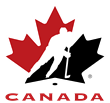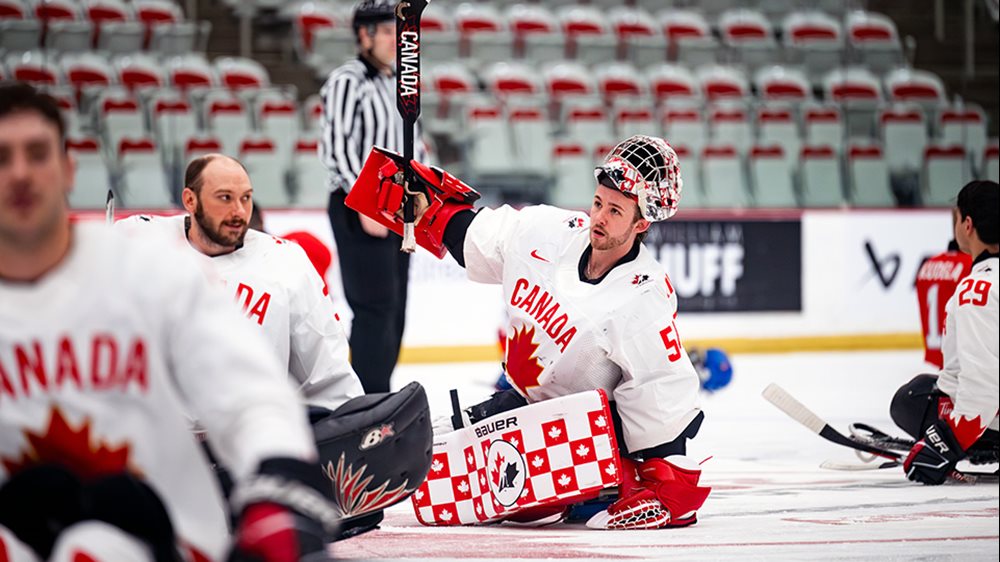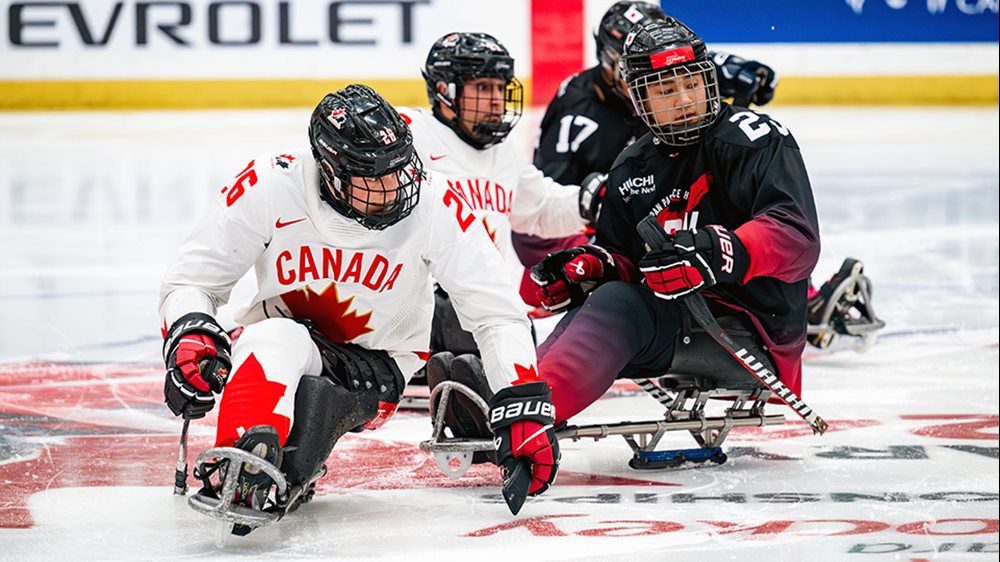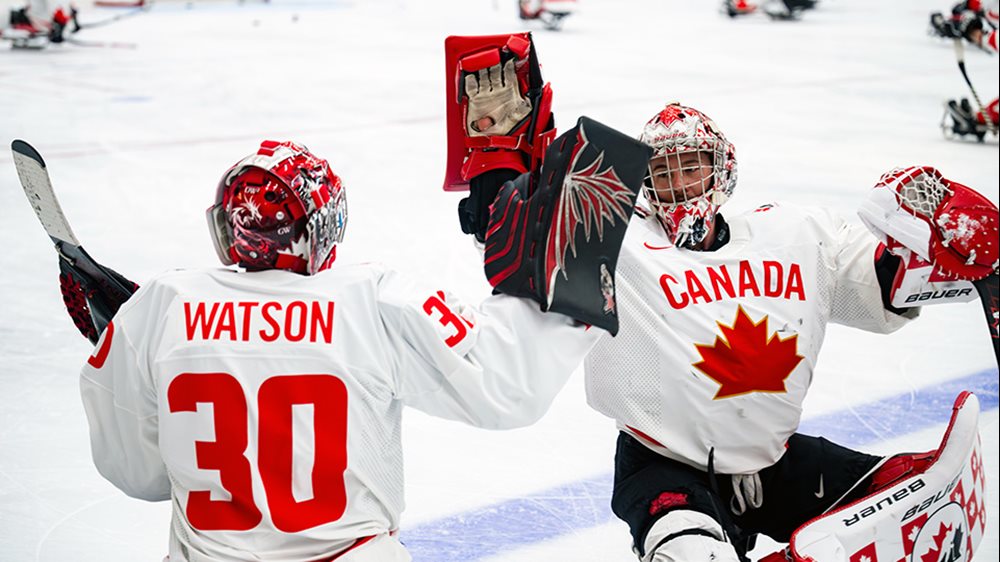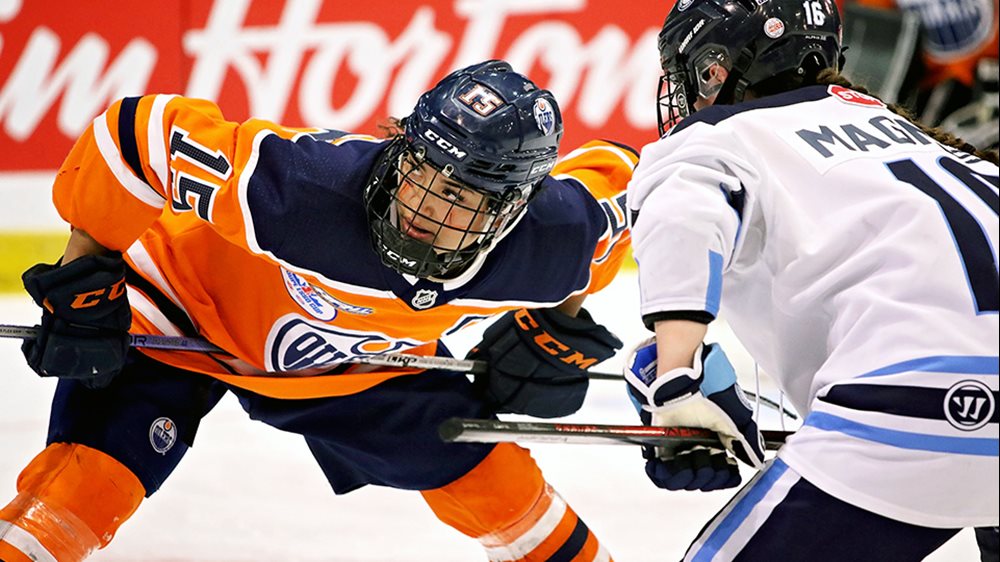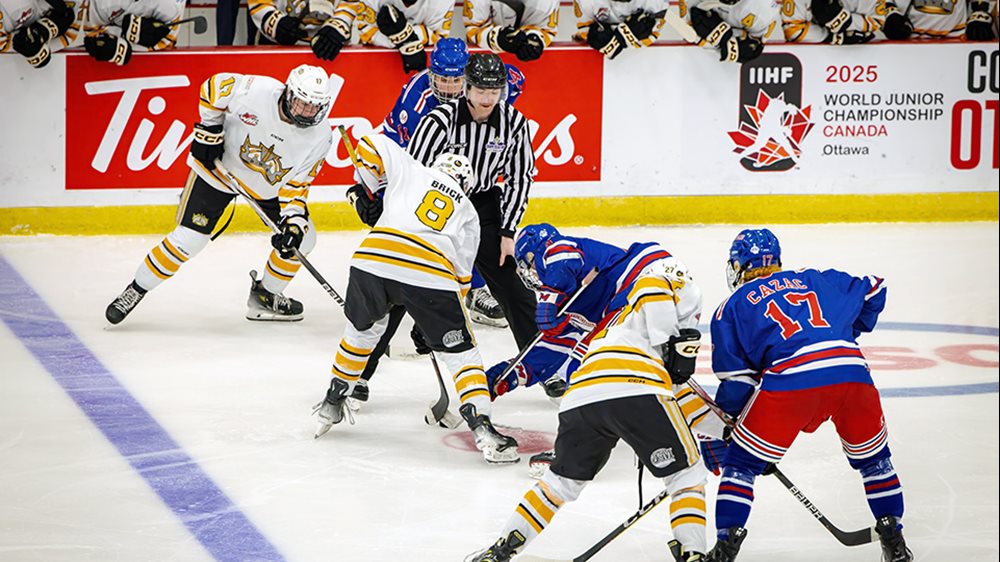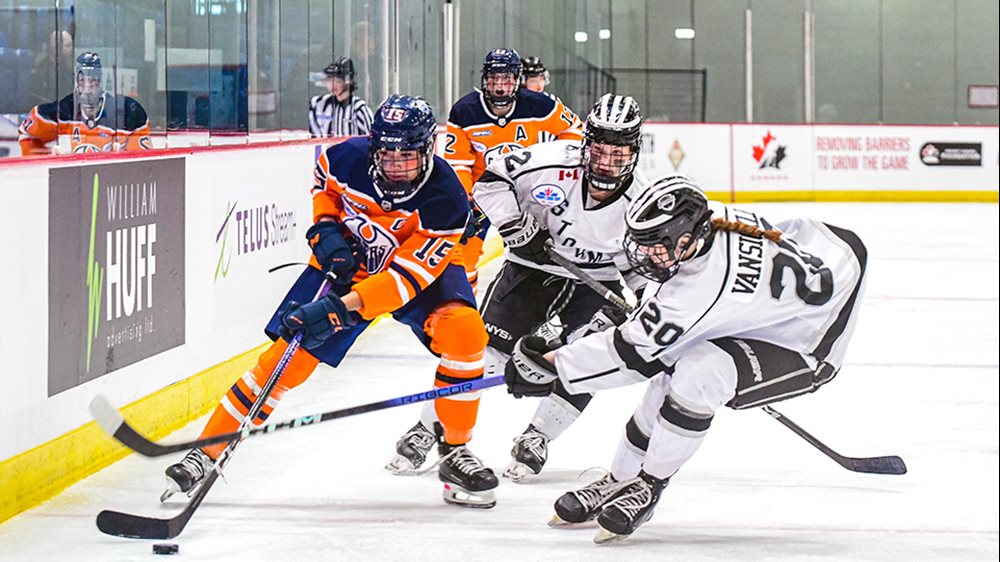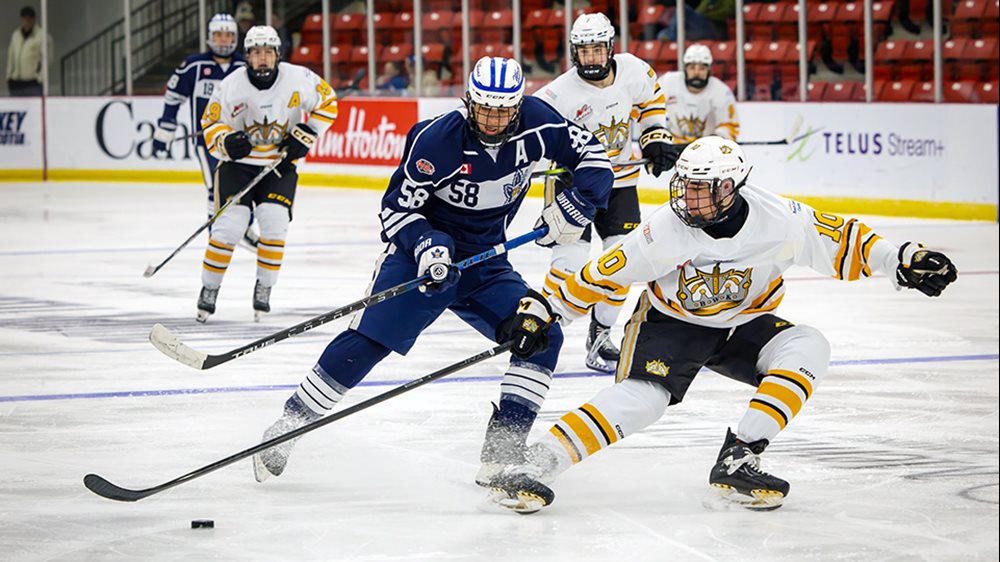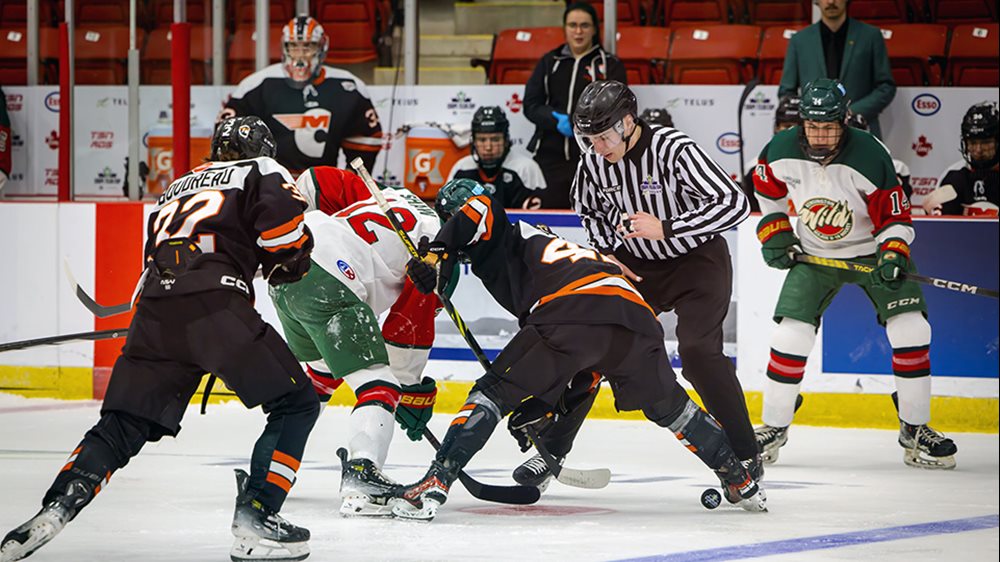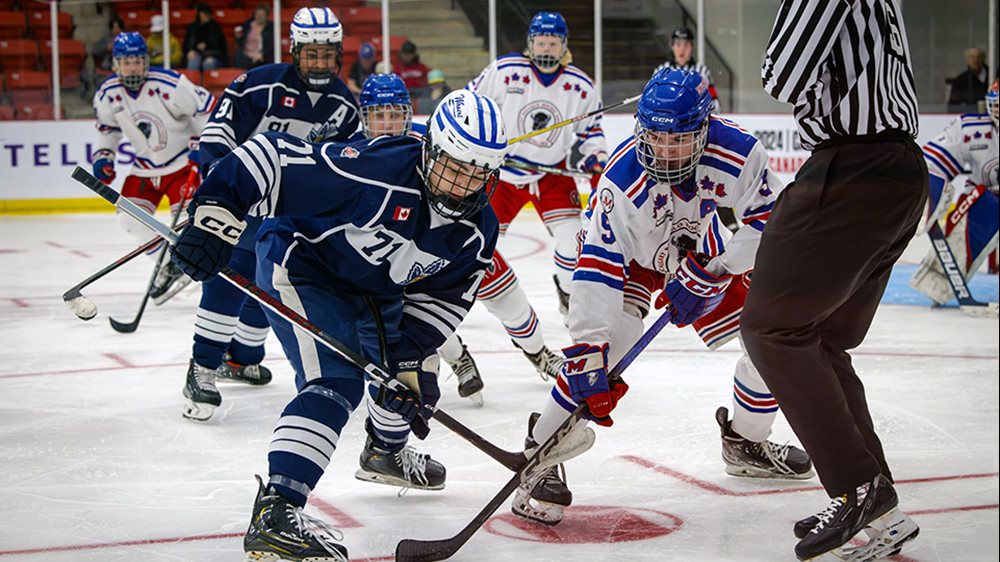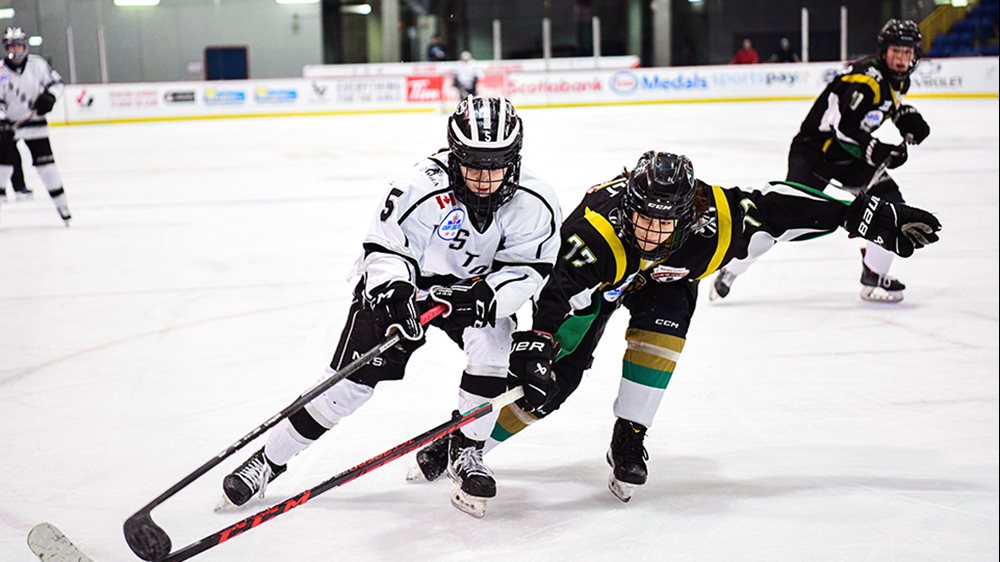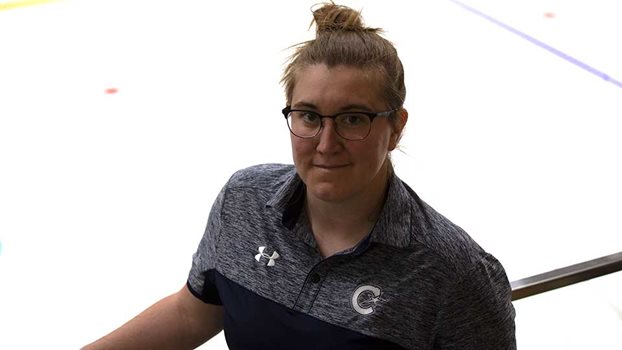
Learning from legends
Valérie Bois had a unique opportunity to elevate her coaching craft last season, working under the guidance of a pair of Olympic gold medallists
After spending the 2017-18 season guiding the women’s team at Cégep de Saint-Laurent, Valérie Bois earned an invitation to meet with Meg Hewings, general manager of the Canadiennes de Montréal of the Canadian Women’s Hockey League.
“It was a bit surreal for me to go meet with the team,” Bois says. “I didn’t really know what the purpose was initially. When I was offered an assistant coach position, I asked myself if I was ready for that. It was a new challenge that was quite big, yet so exciting. I told myself, ‘Yes, I want to grow as a coach.’”
Accepting the job put her on the same bench with Canadian hockey luminaries Caroline Ouellette, a four-time Olympic gold medallist, and Danièle Sauvageau, who led Canada to its first-ever Olympic title in 2002.
Soon after the resignation of Dany Brunet in late November 2018, Ouellette was named interim head coach, with Sauvageau stepping in for games Ouellette had to miss due to previous commitments.
Ouellette, Sauvageau, Bois and fellow assistant Lisa-Marie Breton-Lebreux came together to form the organization’s first all-female coaching staff in a decade.
Ouellette joining the organization was a welcomed reunion for Bois. She had already worked with the four-time Clarkson Cup champion on several occasions – most notably they guided the first all-female team at the Tournoi international de hockey pee-wee de Québec in 2016.
“We knew how we each liked to work and the kinds of systems we preferred, so that [transition] went well.” The strong coaching alliance was built through mutual respect. Bois says she admires how Ouellette has given back to the game by developing the next generation of players, and she thinks Ouellette will contribute to the growth of female coaches.
Her prior history with Sauvageau was a single conversation more than five years ago where Sauvageau encouraged Bois to visit the Université de Montréal to get a sense of what it takes to succeed coaching in the post-secondary ranks.
Bois is thrilled that she had the opportunity to form a tighter relationship with Sauvageau as her coaching acumen grew as a result.
“She challenged me to go deeper when doing video or looking at statistics,” she says. “She would push me to go beyond the obvious to understand why things happened and what changes were needed for the team or a player.”
Her self-confidence also grew as a coach over the past season due to Sauvageau’s advice to “be convinced with what you bring to the team,” and that “you need to be confident with the final choice you make.”
Bois tasted success with Ouellette and Sauvageau as the Canadiennes advanced to the Clarkson Cup final against the Calgary Inferno. The Inferno won the title with a 5-2 decision.
After spending a season improving as a coach under Sauvageau and Ouellette, Bois took the next step of her growth process by attending Hockey Canada’s High Performance II seminar last week to attain her HP2 certification.
Completing the seminar was a worthwhile experience because of the variety of topics covered in the sessions and because of the fellow coaches she met.
Bois is looking forward to utilizing her newly-enhanced skillset this fall when she joins the staff of the women’s team at Bishop’s University, which competes in Division I of the American Collegiate Hockey Association.
She will also collaborate with Ouellette to build a team that will compete at the 2020 Tournoi international de hockey pee-wee de Québec, with her sights set on a future opportunity to work with Canada’s National Women’s Program.
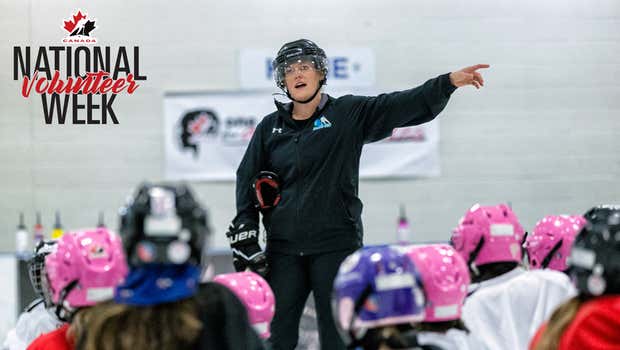
Making an impact in the North
A game-changer in women’s hockey, Kaylee Grant tirelessly gives her time across the territories, volunteering to ensure opportunities exist for women and girls
The first thing Kaylee Grant did when she moved to Yellowknife was find a hockey team.
The operating engineer took a one-year term to gain experience in her industry. Twelve years later, she’s still in the Northwest Territories and hockey has been a reason why she calls it home.
“You gravitate to what you know, and I knew sports,” Grant says. “When you join a sport, you instantly have 17 friends and a group where you feel accepted through a common goal and interest. When I moved to the North, I didn’t know how else to meet friends, so I went to the rink right away.”
Grant grew up around the rink in Antigonish, Nova Scotia. The community was also a hockey hotbed, supporting its Junior A, Junior B and university teams. Being around that passion and community made hockey an important part of her life.
“Playing hockey is what we did,” Grant says. “The community rallied behind our teams and the rinks were full, the atmosphere was great, and hockey was so prominent.”
She played minor hockey in Nova Scotia before moving to Newfoundland and Labrador to play at Memorial University. At 23 years old, she made the move to Yellowknife and knew she would find her community inside a rink.
“I find that the easiest thing to do when you come to a new place to meet people is through sport,” she says. “With joining a hockey team, I was already creating a group of people that were like-minded in interests and similar age. Plus, there are so many opportunities in the North to grow as coaches, players and mentors that have been so helpful.”
Grant’s love for the game wasn’t just as a player—she expanded her knowledge
by getting into coaching while in Nova Scotia. She started as an off-ice
coordinator with the Antigonish Bulldogs women’s under-18 team.
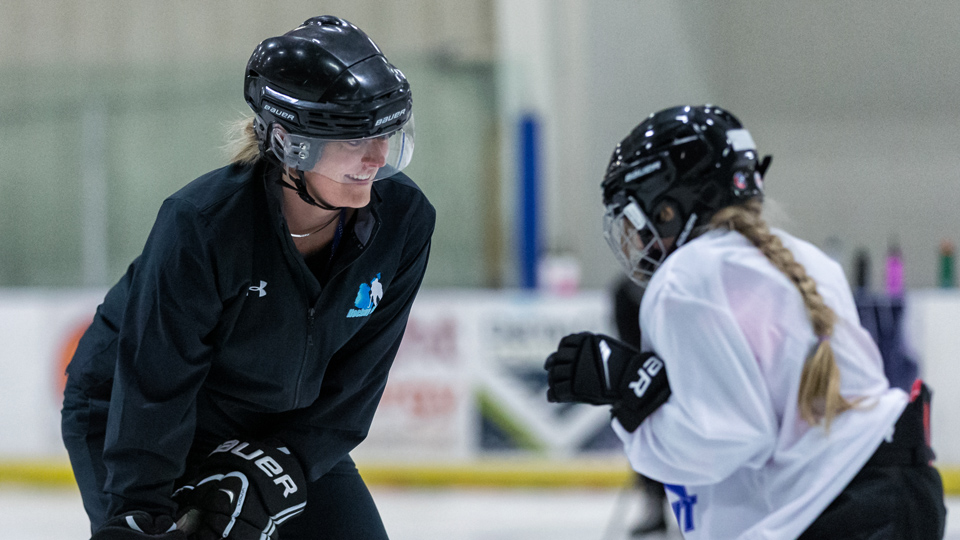
She did her Coach Development 1 training before getting her High Performance 1 training and evaluation certification. She continued to pursue additional coaching certification and training over the years to educate herself and give back to her community.
“I think seeing the female game continuously grow and develop that keeps me interested,” Grant says. “I love to see the progress in my players. I love seeing these players grow and adapt as individuals. Seeing them get involved in coaching is the coolest part.”
Her coaching philosophy is to develop a player’s passion for the game, be a role model and create an environment that is positive for women and girls.
Coaching and mentoring young girls are important to Grant, and she saw that path was through high-level opportunities, particularly by becoming a facilitator to drive more players into the coaching route. She has been working with Hockey North and the Hockey Canada Women Master Coach Developer program, which is focused on removing barriers to coaching education for women.
“Kaylee has volunteered at pretty much every level and she’s getting more involved with training coaches and being a clinician, which is an amazing progression for her,” says Kyle Kugler, executive director of Hockey North and a close friend of Grant. “She’s a great ambassador for hockey by giving back to other coaches through her experiences and helping with their development.”
Through being a volunteer coach, Grant has been able to experience some highlights with her teams, including as head coach for the Arctic Winter Games and Canada Winter Games, and as an assistant coach for Team North at the National Aboriginal Hockey Championship.
“Hockey North has given me so many opportunities and having that support has impacted me as a coach,” Grant says. “I enjoyed every year with those territorial teams and those experiences are a very big reason why I stay here – the coaching opportunities and knowing that we continually have room to grow.”
Another event that Grant was a key volunteer for was the inaugural One For All festival held in Yellowknife in February. It was a four-day event for women and girls from across the N.W.T. and Nunavut that included goaltending clinics, on-ice scrimmages and other off-ice experiences. The event was launched in partnership with Hockey Canada and Hockey North to celebrate the sport and grow grassroots hockey in the North.
“Kaylee is one of our co-leads in the North, and when we set out to deliver this programming in Yellowknife, it was a no-brainer that she would be involved. And typical Kaylee, she just runs with a task and completely owns it,” says Katie Greenway, manager of women’s and girls’ hockey with Hockey Canada. “To have champions like Kaylee that dedicate themselves to their community and sport is so important.”
Giving back through coaching is just what Grant does—it’s like a hobby for her and she does it for others and to see more women in the sport, not for what it could bring to her.
“I’ve known Kaylee for a few years now and she has so much on her plate, but she never says no,” Greenway says. “She doesn’t do it for the accolades, but out of the goodness of her heart with a smile on her face. She’s fantastic and is really impacting everyone that she comes across.”
Grant’s impact on hockey in the North has been felt by many of the girls she has coached, mentored and played with over the past 12 years, but it’s the bigger picture that is most important to her.
“I’m not going to say that myself, individually, has drastically impacted female hockey in the North. I think I am a very small portion of what’s been going on in the North in the last 10 years,” Grant says. “I would like to think that I have helped develop more female coaches and I’ve been a good role model. I think if I have impacted hockey in the North, its pushing players to want to coach a little bit, but it’s a collective—everyone has left their mark on the female game.”
For Kugler, as the lone administrator for Hockey North, having volunteers like Kaylee is so critical to the work and development of hockey players.
“I think volunteers are essential for the delivery of anything in small communities in the North,” he says. “[Kaylee] takes on more than we even realize. Coaches have a huge influence on teams and athletes and she’s a positive role model and advocate for female hockey. She’s selfless with her time and she’s just an awesome person.”
Interested in becoming a coach? Visit HockeyCanada.ca/Coaching, or contact your local hockey association or Hockey Canada Member for more information.
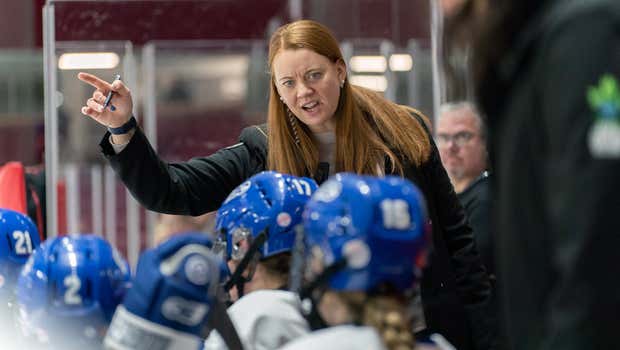
From stage lights to hockey heights
After transitioning from improv acting to coaching high-level hockey, Whitney Juszkiewicz continues to flourish behind the bench
Before the gold medal, the accolades and the countless hours behind the bench coaching high-level hockey, Whitney Juszkiewicz was an improv actor in Vancouver.
“I was on stage every Sunday throwing on an attitude, throwing on an accent, throwing on a persona and going for it,” recalls Juszkiewicz.
Born in Alberta, Juszkiewicz grew up in Edmonton and was deeply involved in hockey, attending St. Francis Xavier High Performance Hockey Academy before enrolling at the University of Saskatchewan, where she studied liberal arts and was a member of the Huskies hockey team. She then studied live performance at Red Deer Polytechnic before embarking on a career in live performance.
“I spent almost eight years in the film, television and theatre industry and I did a lot of stuff in Red Deer,” Juszkiewicz says. “My friends and I then started a theatre company (BullSkit) that specialized in improv and sketch comedy like Saturday Night Live or Second City.”
By 2012, Juszkiewicz was living in Vancouver, running her theatre company, performing improv and providing hockey lessons to kids. It was after one of those lessons that a parent asked if she had ever considered coaching hockey. After thinking it over, Juszkiewicz decided to go for it and soon found herself behind the bench of a Vancouver-area U11 boys’ team.
“I must have done a pretty good job because in my first year I won rookie coach of the year,” she says.
A little more than a decade later, Juszkiewicz is now a respected high-performance hockey coach, having been behind the bench of numerous high-level boys’ and girls’ teams throughout Greater Vancouver, and the owner of Fire and Ice Hockey Development. She has held also held various coaching-related positions with BC Hockey, briefly served as the executive director of the Langley Minor Hockey Association, became a certified Hockey Canada Skills Coach and worked as a female coach mentor with the NHL Coaches’ Association during that time.
“I put the coaching hat on and I haven’t looked back,” says Juszkiewicz, who is also a coach in the B.C. provincial program, an associate coach with a U18 Prep team at the Delta Hockey Academy and head coach of a female U15 AAA team in the Pacific Coast Amateur Hockey Association.
In February, as an assistant coach, Juszkiewicz helped Team BC win its first-ever gold medal in women’s hockey at the 2023 Canada Winter Games.
“It was a privilege to work with those young women, some of whom went on to win gold at the women’s under-18 world championship,” she says. “It was just an unbelievable experience and it will definitely be one of my all-time favourite memories as a coach.”
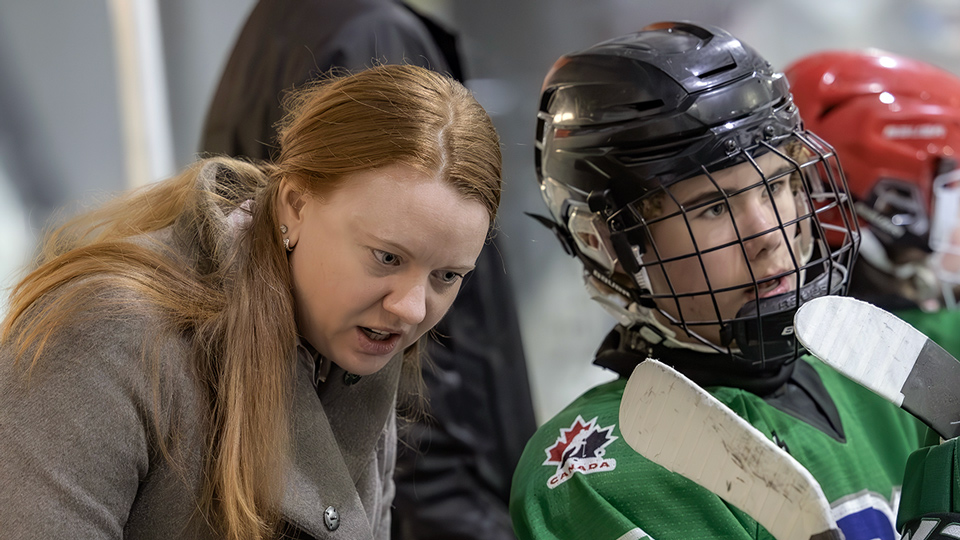
Same skills, different role
Although Juszkiewicz is no longer performing improv on weekends, she has found that many of the skills she developed as an actor have transferred over into the coaching world.
“[Coaching] hockey is reading the room and understanding that this may not be the right time to really drill in the negatives and that everyone needs a little bit of a bump, they need value,” she says.
In the acting world, Juszkiewicz says, a strong emphasis is placed on organization, understanding objectives and having everyone buy into their roles to ensure everything is successful, just like it is in hockey.
“You have the best shows when everybody understands the objective and I find the coaching world is very much like that,” says Juszkiewicz, who continues to dabble in acting, having appeared as an extra in Mighty Ducks: Game Changers. “Everyone's got a job, everyone's got a special talent that they're bringing; there is a reason why they're there and if we can just dig into those specialties and create a nice, inclusive, safe environment, we're going to have a great time.”
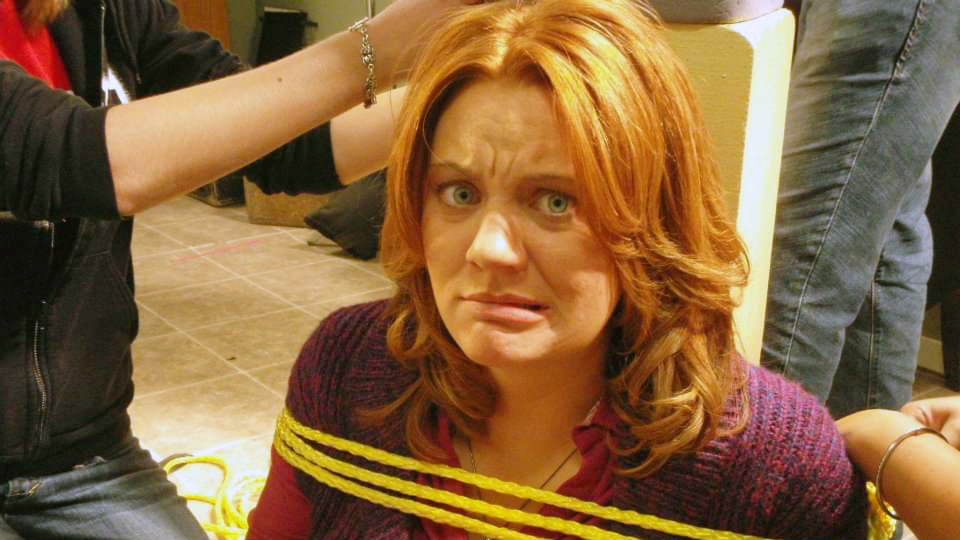
Learning and growing
Over the last four years, Juszkiewicz has been participating in Hockey Canada's Women Master Coach Developer (WMCD) program, an elite initiative that is providing 38 high-performance women’s hockey coaches with the skills they need to deliver clinics and train future facilitators and evaluators as part of an effort to increase the number of women-led coaching programs nationwide.
“It's been able to give me that extra credibility, that extra training and that extra guidance that I find I am now using with all coaches that either I work with or work for me,” Juszkiewicz says about the program, which she is set to complete later this year. “It’s been a wonderful opportunity to understand how to work with people how to train them, how are you going to create a learning environment as opposed to more of a lecture and just listen to what I have to say environment.”
WMCD participants are nominated by Hockey Canada Members and must have completed several certification and training courses to even be considered. One of the biggest benefits of being in WMCD has been connecting with 37 other highly talented women, says Juszkiewicz.
“I am one of the only women in my province in the program. If I didn't have the ability to connect with other girls in other provinces, I would feel pretty lonely and like I was on my own little island. So, I think the best part is that you are getting some of the top minds across the country in terms of female leadership and female hockey getting together and that is very empowering,” she explains. “It's extremely empowering to know that you're not by yourself.”
Juszkiewicz’s hard work and continuous dedication to her craft over the years has paid dividends. In 2021, she was named BFL Female Coach of the Year for British Columbia in the Community category, and in 2022 she was awarded the BC Hockey Development Award for coaching. She says her drive for continuous learning and growth is fueled by her desire to continue coaching in the game she loves.
“If you don't continue pushing yourself to learn and develop, you get stagnant and ultimately you get left behind.”
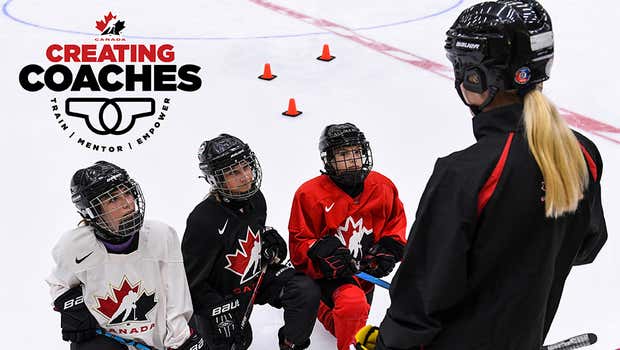
Eight student-athletes to participate in Creating Coaches program
Creating Coaches’ third cohort runs until end of 2024-25 season
CALGARY, AB – Hockey Canada and U SPORTS have announced the eight student-athletes who have been selected to join Creating Coaches, a program designed to increase the number of women coaching hockey in Canada, as part of its third cohort which will run during the 2023-24 and 2024-25 seasons.
Launched in 2021 through a partnership between Hockey Canada, U SPORTS and the Hockey Canada Foundation, Creating Coaches provides training and mentorship to current U SPORTS student-athletes who are concurrently looking to begin their coaching careers. Participants in the program serve as an assistant coach with a U13, U15 or U18 girls’ hockey team for the duration of the two seasons and receive coach education, professional development opportunities and an honorarium.
This year’s cohort includes student-athletes from eight U SPORTS women’s hockey programs across three of its conferences:
• Alexis Anonech (York University, OUA)
• Emmy Fecteau (Concordia University, RSEQ)
• Lyndsey Janes (Mount Royal University, CW)
• Madison Laberge (Nipissing University, OUA)
• Isabelle Lajoie (University of Alberta, CW)
• Sophie Lalor (University of Saskatchewan, CW)
• Sarah-Maude Lavoie (McGill University, RSEQ)
• Chihiro Suzuki (Guelph University, OUA)
“We are thrilled to welcome these eight accomplished student-athletes to Creating Coaches and look forward to working with them during the next two seasons,” said Marin Hickox, Hockey Canada’s vice-president of women and girls’ hockey. “Creating Coaches is an important program to support and develop hockey’s next generation of leaders and we are grateful to the U SPORTS coaches who nominated this talented group.
“Girls who have been coached by a woman are more likely to transition into a coaching role at the end of their playing careers, and it is our intention that this program will positively influence the recruitment and retention of girls and women in leadership roles in the sport.”
Since its inception, Creating Coaches has included student-athletes from 16 U SPORTS women’s hockey programs and all four of its conferences.
“The eight student-athletes selected to join Creating Coaches are tremendous ambassadors for hockey and university sport in Canada,” said Lisette Johnson-Stapley, chief sport officer at U SPORTS. “We have already seen the positive impact that this program has had inspiring young girls in communities across the country and we are excited for Alexis, Chihiro, Emmy, Isabelle, Lyndsey, Madison, Sarah-Maude and Sophie to begin their coaching careers while continuing to represent their universities with pride as student-athletes.”
The Creating Coaches selection committee includes representation from Hockey Canada, U SPORTS, Hockey Canada’s Members and the Hockey Canada Foundation Board of Directors.
During National Coaches Week, Hockey Canada is celebrating the positive impact that coaches have on athletes in communities from coast to coast to coast, with #ThanksCoach resources and features shared here.
To learn more about Hockey Canada, please visit HockeyCanada.ca, or follow along through social media on Facebook, X and Instagram.
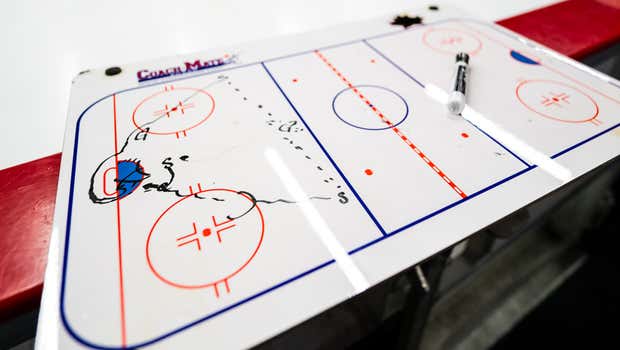
Resources for Canadian coaches
From upcoming training opportunities to ideas for skills and drills, Hockey Canada has a variety of resources available for coaches of all levels across the country
Coaches are the backbone of the hockey community. Whether you are a regular behind the bench or it’s your first season as a coach, Hockey Canada has a variety of resources available to help you succeed on your coaching journey.
How do I start my coaching journey?
If you want to get started coaching, make Hockey Canada’s National Coach Certification Program (NCCP) your first stop. This program enables coaches to build their coaching tools and knowledge of the game to work effectively with their players. Hockey Canada offers six coaching clinics and five instructional stream areas of focus.
Those looking to be trained to coach in the Community Sport stream can participate in Coach 1 — Intro to Coach or Coach 2 — Coach Level. NCCP certification is not required at either of these levels; a coach will remain trained indefinitely after completing these streams. Register for a coaching clinic or visit your Member website for more information.
Respect in Sport
The Respect in Sport Activity Leader/Coach program is an engaging and easy-to-use online training course that helps hockey coaches and youth leaders recognize, understand and respond to issues of bullying, abuse, harassment and discrimination. The course also aims to build a holistic culture of respect within the sports community and provide fundamental training tools to enable all coaches to become even better role models for the young athletes in their care.
In Canadian hockey, more than 230,000 coaches are certified by the Respect Group Inc.
Skills and drills
The Hockey Canada Network gives coaches and players the tools to succeed with drills, skills, videos, practice plans and articles on their tablet or phone. There are over 1,500 drills and more than 100 lesson plans available on the app, with more added throughout the season.
Looking for more drill inspiration? Hockey Canada will frequently post skill videos on its social channels that can be incorporated into practice plans. Search the hashtag #HCSkillsCoach and #HCGoalieCoach on X (formerly known as Twitter), Facebook and Instagram to find more drill videos to utilize on the ice.
Drill Hub is another resource available to find skills and drills for players. It is a free resource for coaches to access hundreds of drills and videos. There are also pre-made practice plans available to download, along with templates for game rosters, player stats, scouting reports and more.
Women in coaching
We Are Coaches
As a free, women-only coach program, We Are Coaches was designed to increase the number of trained women coaches in Canada in order to provide mentors and role models for young participants. The program aims to build infrastructure to support and sustain the participation of girls and women in hockey in Canada, develop women role models and leaders within the hockey community and remove barriers to coaching education for women.
Women Master Coach Developer
Launched in 2019, the Women Master Coach Developer (WMCD) program introduces more hockey coaching programs led by women. The program has equipped 38 coach leaders to not only deliver coach clinics, but also train future facilitators and evaluators in each Member.
To participate in the program, delegates can be nominated by their Member each season. Delegates are required to complete multiple trainings and certifications in the program, and upon successful completion, they will take a leadership role to optimize the delivery of the We Are Coaches program and support women coaches within their communities.
Creating Coaches
In 2021, the Hockey Canada Foundation partnered with U SPORTS to launch Creating Coaches, a program designed to increase the number of women in coaching positions in Canada. This two-year mentorship program places a focus on training, mentoring and empowering women behind the bench.
Candidates for the program are nominated by their U SPORTS coaches to participate in Creating Coaches.
How do I get further coaching support?
Are you looking for more support? Do you have a question about coaching in your community? Hockey Canada and its Members have coaching resources and helpful staff available to help you on your coaching journey.
Click here to find the coaching contact information for your Member.
Do you have more questions about coaching? Visit these Frequently Asked Questions pages to learn more about the following topics:
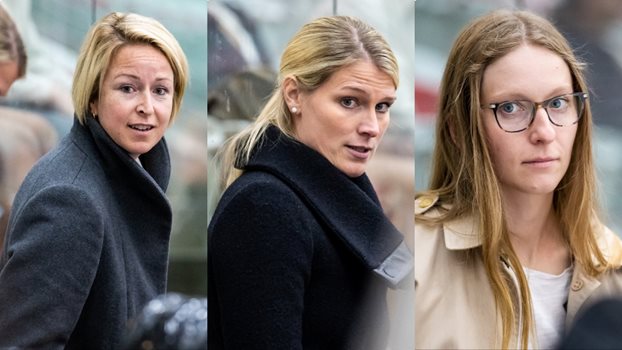
If you see it, you can be it
Growing the game beyond the ice, Courtney Birchard-Kessel, Tara Watchorn and Stefanie McKeough made history as the first all-women coaching staff in under-18 program history
On the ice, Canada’s National Women’s Under-18 Team completed a three-game sweep of the United States in its summer series for the first time since 2007, but behind the bench, the coaching staff was making a little history.
Head coach Courtney Birchard-Kessel and assistants Stefanie McKeough and Tara Watchorn became the first all-women coaching staff in the history of Canada’s women’s U18 program. The result against the Americans was terrific, but the impact the series will have on growing women’s hockey goes beyond the ice.
“We’re in such a good time for women in coaching positions,” says Watchorn. “With pioneers like Hayley Wickenheiser and Caroline Ouellette, it’s great to see that women are starting to get in on the coaching side now and there’s a path to making coaching a career, which was really tough before. It’s really cool to see that transition where a wave of players who have already had a hockey career now able to move into coaching.”
To add to the accomplishment, all three members of the coaching staff are alumnae of National Women’s Program, having shared the ice together at camps and events over the last decade and a half, including a golden experience with Canada’s National Women’s Development Team at the 2011 MLP Cup, the only time the three wore the Maple Leaf together.
Combined, the three played 183 international games; Birchard-Kessel appeared in three IIHF Women’s World Championships, winning gold in 2012, Watchorn was an Olympic gold medallist in 2014 and played at three women’s worlds, and McKeough was part of the Canadian contingent at the 2009 IIHF World Women’s U18 Championship.
So coming back to the national program and having a reunion of sorts behind the bench meant a little bit extra for the trio.
“Between the three of us, our paths have crossed so many times throughout our own playing careers, and we have a lot of shared experiences and values we learned along the way,” Watchorn says. “For the under-18 age group, they’re so young and for a lot of them, it’s their first high-performance environment. So, for us to be able to understand and anticipate those stressors and telling them to focus on just being present, enjoying the time with teammates and making them better, you’re always going to play better.”
Watchorn has always wanted to be a coach. Even during a successful playing career that included Olympics, women’s worlds and hoisting the Clarkson Cup with the CWHL’s Boston Blades of the CWHL in 2015, Watchorn knew she wanted to pass on the positive experiences she’s had in the game.
“I am so fortunate to be part of cultures and teams that truly changed my life,” says the Newcastle, Ont., native, who is the first-ever head coach of the women’s program at Stonehill College, “so my hope is to create that environment and culture for other young women who can come through and be inspired [and] challenged, and become leaders and people who impact the world.”
Although coaching isn’t always the plan for players, hockey sometimes finds a way back. After hanging up her skates after a five-year college career at the University of Wisconsin (which included an NCAA national title in 2011), McKeough thought coaching was one of the last things she would be doing with her free time.
But the game eventually took her to Sweden, where she was able to get a taste of coaching and was bitten by the bug. To this day, McKeough admits it continues to surprise her every time she walks into the rink as a full-time coach.
“Hockey players are humans first,” the Carlsbad Springs, Ont., product says. “I learned through coaching that we have to help the person before helping the hockey player, and being able to be there for somebody is something that motivates me when I show up at the rink every day.”
As an assistant coach with the University of Ottawa, McKeough gets to work and learn from veteran U SPORTS coaches like Vicky Sunohara (Toronto), Rachel Flanagan (Guelph) and Gee-Gees bench boss Chelsea Grills. They’ve been able to set examples for McKeough previously as a player and now as a coach.
“Vicky was actually one of my coaches at my first U18 camp and Rachel was an assistant coach during one of my years on the under-22 team, so now that I get to work with them, I’ve been able to gain a more deeper respect for what they do as coaches.
“By having those ’If you see it, you can be it‘ situations, I’ve been able to continue to build those relationships with other coaches and the players.”
The growth and visibility of women in coaching and leadership positions continues to grow. Just this summer, Hockey Canada alumna Jessica Campbell was hired as an assistant coach by the AHL’s Coachella Valley Firebirds, longtime national team defenceman Laura Fortino took on the same role with the OHL’s Hamilton Bulldogs, and 2022 Olympic gold medallists Marie-Philip Poulin and Rebecca Johnston took on player development roles with the Montreal Canadiens and Calgary Flames, respectively.
“Diversity in leadership is so valuable,” Watchorn says. “For people to bring different backgrounds, and to be able to relate to the players, it’s just so important. If you see it, you can be it.”
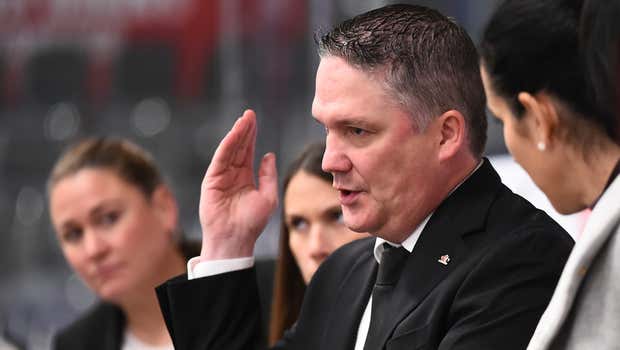
In my own words: Troy Ryan
The gold medal-winning head coach reflects on how he got involved in the women’s game, what makes Canada’s National Women’s Team so special and the best advice he’s received
My first introduction with the women’s game was many years ago when I was playing hockey at the University of New Brunswick in the mid-1990s. They didn’t have a women’s varsity team, but they had a club team, and every once in a while, the team needed extra support with coaching. So, for a brief time while I was playing, I jumped on the ice to help.
After that, I started to build my own coaching career on the men’s side. I was actually in Calgary working at Hockey Canada’s under-17 camp and I received a call from Darren Sutherland at Hockey Nova Scotia. He said they had to make a last-minute coaching change for their Canada Winter Games women’s hockey team, and called me first to see if I had anyone I would recommend. I think I gave them three names, but two weren’t available and one wasn’t interested, so they called me back and just asked me if I would be interested. I jumped at the opportunity and I coached at that Canada Winter Games in 2015.
The following year, that group of women I coached at the Canada Winter
Games got together and wrote a letter to Hockey Nova Scotia to recommend me
or nominate me for a coaching award, and I ended up winning that award.
It’s kind of a cheesy part of the story, but they were playing on my
heartstrings a little bit and I got hooked to women’s hockey right away.
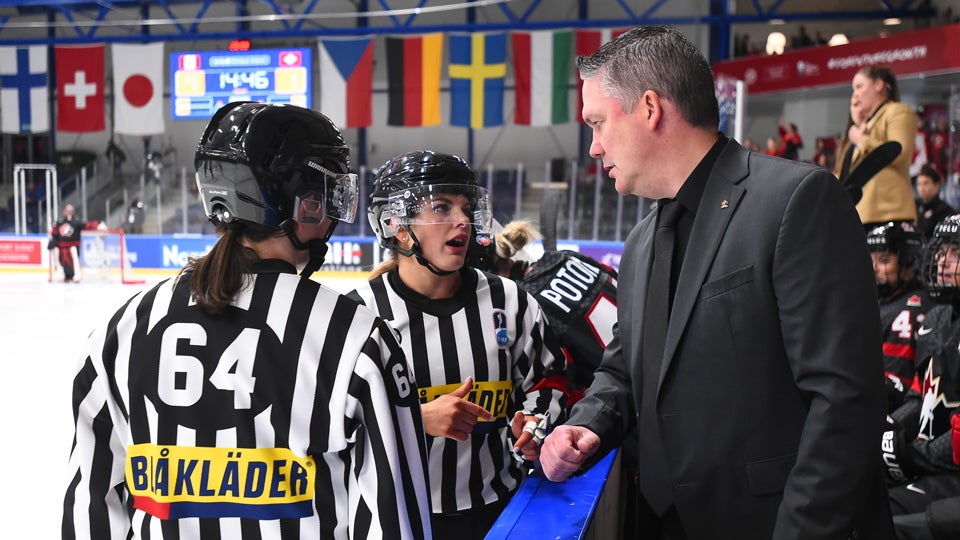
One of the biggest reasons why I love coaching in women’s hockey is the passion they have for the game. The other part is just the high-performance side of it—when you’re coaching these women, they are true professionals. They invest almost all their time in their craft. But it really comes down to their passion. The passion they have for the game, the passion they have to play for their country and the passion they have for each other really separates them from anybody else that I’ve ever coached. They are just a special group of athletes.
I honestly feel spoiled all the time working with Canada’s National Women’s Team. Every day is fun working with these players and staff. I think the biggest thing driving me as a coach is I still think this group has room to grow. I think we’ve taken huge strides in the right direction. We’re a better team now than we have been in the past. They genuinely care about each other’s success, and they share in those successes. I just still think there’s room to improve, and if I didn’t believe that, I wouldn’t be doing my job.
Some of the best parts about coaching this team are things no one would ever see. Like when you have a video session with an athlete and you bridge a gap with them and you can see them excel in that area on the ice. It’s just that little look you get when they come off the ice after they’ve accomplished something that you’ve discussed with them. Those moments to me are the real special ones. The wins and all that, that’s obviously fun, but a lot of the times they’re more of a relief than they are a high moment. It’s the little moments along the way.
I remember one special moment at the Olympics in Beijing. Because of COVID-19, the athletes had to put the medals around each other’s necks. That was just so unique and special. You look at each one while they’re doing it, and you just have a story in your head for each of those people. Maybe it’s an obstacle they had to overcome to be in that situation. Several of them had been released from the team prior to world championships, and they did what they could to get back into the mix. So, I remember just almost checking out mentally during that five-minute span of the medal ceremony and just reflecting on some of the cool stories that each person had to overcome to get to that moment. To see them getting an Olympic gold medal around their necks from one of their teammates was a pretty cool experience.
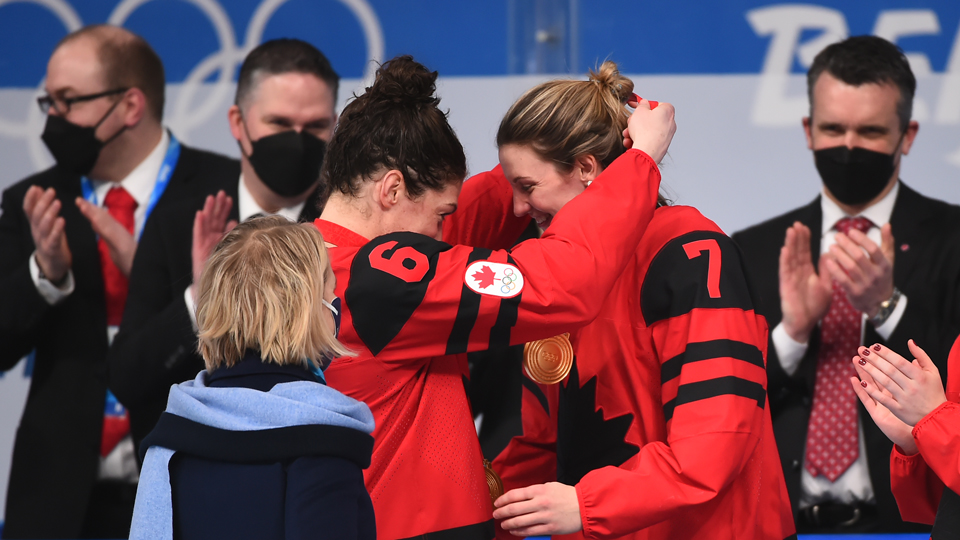
Mike Johnston coached me at the University of New Brunswick. He’s actually Rebecca Johnston’s uncle, which is funny. When I first started coaching, he told me no matter what I do in hockey, always have your province’s back. A lot of people, when they first get that opportunity in U18 or junior hockey, they forget about their provincial program. I looked up to him so much when I was younger, so I always made sure that no matter what job I had in the game, if Hockey Nova Scotia ever reached out to me, I’d be there to volunteer and to help. If I had went along my route of coaching in junior hockey or university hockey, I never would have had the experiences that ended up benefitting me the most with this job. The best experiences I had with my provincial Member were participating in short-term events, working with the best players and coaches, and gaining more high-performance experience.
Another good piece of advice I got a long time ago was simple—meet people where they’re at, even at the national team level. There are athletes coming in that are four-time Olympians, then there are some that are just hoping to get centralized or make a world championship team. As a coach, it’s so important to understand the different dynamics, and the dynamics in the women’s game tend to be much different than in the men’s game.
When I first started coaching, one of the typical questions people asked me was the difference between coaching men and coaching women. I think a lot of people make a mistake in trying to put an umbrella over their group. I always thought good coaches coach their athletes as individuals. Take the time to get to know your athletes and know what goals they have and what they want to achieve. Right now, we are trying to build our program to win a gold medal at the 2026 Olympic Games. In order to get there, I think we need to really take care of a lot of the individual stories that are involved on our team. That will be a bit more of my focus in these first few years of the quad as we get ready for 2026.

Sharing her passion for hockey
The national winner of the 2022 BFL Female Coach of the Year (Competitive), Laurence Beaulieu is driven by her love of the game as she climbs the coaching ladder
After earning a bachelor’s degree in psychology from the University of Montreal – playing five years with the Carabins and winning a U SPORTS national title in 2016 – and then a specialized graduate diploma (DESS) in sports management from HEC Montreal, the defenceman joined the Canadiennes de Montréal of the Canadian Women’s Hockey League (CWHL) in 2017.
She spent only one season with the Canadiennes, calling it a career at the age of 26 to become a coach.
“It was more or less by chance,” says Beaulieu, the national winner of the BFL Female Coach of the Year in the Competitive category. “I started [coaching] when I was 16. From then until my year with the Canadiennes, I was a summer coach at the AAA level. I was a private coach for both boys and girls, but I never really thought about coaching a full season. I was so overwhelmed with what I was doing as an athlete that I never thought there would be a next step.”
Beaulieu, 30, got a full-time job as a player development assistant with Hockey Quebec, but to do so, she had to give up her on-ice career. The benefits, though, were obvious.
“My work at Hockey Quebec gave me the opportunity to learn more about development,” says the Stoneham, Que., native. “Someone from the Richelieu region approached me because he really wanted to manage a team with a woman. I don’t know how he found me or what contact it was, but it was the father of a player I had met, and he said that he really wanted to run the [Cégep André-Laurendeau] team with me. I told him I wanted to be an assistant, but nothing more. Then I found out that I liked it more than I thought I would.”
The following year, Beaulieu became the head coach of the Remparts du Richelieu U18 AAA team in addition to continuing her position as assistant coach with Cégep André-Laurendeau.
“I wasn’t surprised that I liked coaching, but that I liked it so much. [I liked that] you do it all year long, on weekends, in the evenings... I wanted to do it more than two months a year,” she says.
Beaulieu really enjoys teaching the kids. The fact her players have not yet peaked allows her to maximize the role she plays in their development.
“Those players still have fun in everything they do,” she says. “They really appreciate the investment you make and the time you take for them. That’s something I really like about this age group. They are passionate and still have plenty of goals to achieve at the college or national levels. It’s an age group that is full of goals and potential.”
Still, it’s very important to have fun on the ice at that age. While Beaulieu is well aware of this, she also believes that it is possible to have fun and push yourself at the same time.
“I want the girls to like to surpass themselves while knowing that it’s always necessary to have fun," explains Beaulieu, who served as defence coach with the Titans du Cégep Limoilou last season. “It’s possible to have fun while working 100% all the time. If you go out on the ice every day and you love what you do, you will improve. At the end of the year, those girls come to me for more feedback, to watch more videos. It’s a teachable mentality and the girls want to get more. In the end, it works!”
It’s clear the young coach is passionate about her sport, whether she was on the ice or behind the bench.
But nowhere is that passion more evident than when she is able to share it with others.
“I’m very proud when I see a player’s passion grow over the course of the year," Beaulieu says. “She already loved hockey, but she didn’t realize how much she loved it for details that she probably wasn’t aware of at first. As time goes on, as she practices things, she asks for even more feedback and information. I’m very proud of being able to pass it on; it’s my greatest accomplishment even if it’s not really mine. It takes an athlete who is willing to do it to make it there, but it’s something I really enjoy doing.”
After coaching at the college and U18 AAA levels, Beaulieu does not intend to stop there. Even if there is no rush, she is starting to think about the next steps she could take.
“Obviously, I want to get as high as I can, but I think there are steps to take before that,” she says. Right now, I am in Limoilou and I am really proud of what I am doing. Maybe my next step would be to join Team Quebec at the provincial level. That’s the next step I want to take, but I’m not setting any limits. We’ll see where it takes me.”
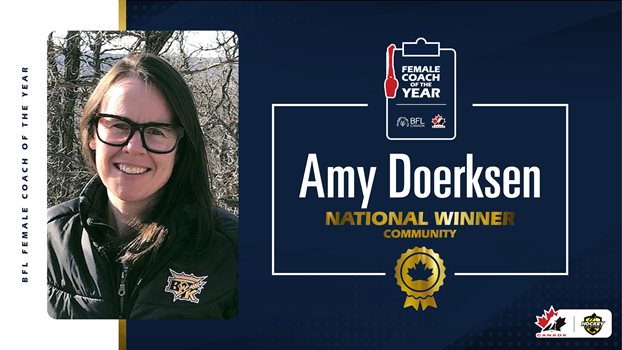
A fierce fighter for the women’s game
The national winner of the 2022 BFL Female Coach of the Year (Community), Amy Doerksen is more than a coach – she’s an advocate who is pushing for the progression of women’s hockey
The inaugural event, held in early June in Brandon, Man., was a smashing success and included over 130 young girls, being taught on-ice skills by 12 coaches with an array of experience, those from the grassroots level of the game right up to elite AAA club hockey.
The title of the camp?
The Fierce Female Hockey Camp.
Doerksen, the national winner of the 2022 BFL Female Coach of the Year Award in the Community category, believes in being fierce. She says that’s how women’s hockey is going to break down barriers, overcome hurdles and progress to the status that it deserves.
“It blew me away, the comments that I have received from parents of players who attended, from coaches who participated,” says Doerksen, a lifelong hockey player, longtime coach and extreme advocate for the women’s game. “A quote I got from an under-18 player, who perfectly summarizes exactly the reason why I created this camp … she won a provincial championship this season, she’s playing at the highest level that a girl can play at in minor hockey in Manitoba, and she still had people saying ‘It doesn’t count, you play girls’ hockey.’
“That’s not OK. They need to feel fierce; they need to feel amazing.”
Doerksen speaks from experience. Like many women in the game, she has faced challenges to be heard and seen, challenges that many men simply don’t have to deal with. As a kid, she played ringette – “Girls didn’t play hockey and we were directed into the sport of ringette” – but fell in love with hockey during her junior high school years. Those days in Manitoba, there were few women’s hockey players and Doerksen remembers at age 12 getting dressed for practices next to 16- and 17-year-olds.
Doerksen would continue to excel in hockey over the years and ended up playing for the University of Manitoba. After her days with the Bisons, Doerksen headed to Ryerson University in Toronto (where the talented multi-sport athlete played soccer for the Rams) and, post graduation, lived in Kenora, Ont. It is there when she first entered the coaching ranks with a local high school team.
Doerksen, who is a mom to three and stepmom to one, is a published author of children’s books. On her blog, which can be found at AmyDoerksen.com, she lists five loves: family, feminism, hockey, Canada’s north and books.
She lived in Yellowknife, N.W.T., for just under five years and that time made a lasting impression on Doerksen.
“I’m appreciative of how much the north invested in developing female coaches,” says Doerksen. “I think the rest of Canada can learn a lot from the progressive views of the north. They’re ahead of the game.”
Doerksen has held various coaching and leadership positions in hockey, starting as an assistant coach with the Beaver Brae Broncos high school team in Kenora from 2001-03. She was president of the Yellowknife Women’s Hockey League from 2007-11 and, during her time up north, was also assistant coach of the Northwest Territories girls’ team for the Arctic Winter Games.
This season, Doerksen could be seen on the ice at the grassroots level with an under-7 team and also with high-performance athletes on the Brandon Wheat Kings female U15 club.
Off the ice, Doerksen has also been part of hockey boards and was the U7 division director with Hockey Brandon from 2020-22. Her full list of teams, accomplishments and honours is extremely impressive and too long to list.
But there’s more work to be done. Too many times, Doerksen has been the lone woman on the ice, the lone woman in the hockey boardroom that is still dominated by men. While she has seen progress over the past 20 years of her involvement as a coach and leader, Doerksen says that progress should be happening at a much quicker rate.
“I started crying on the call,” she says when asked about her reaction to being named a BFL Female Coach of the Year. “It was the day after my hockey camp and I was really a hot mess from the experience. I was completely overwhelmed with what an amazing weekend it was. I’m grateful. I’m getting emotional right now because it’s incredible. As women, we need to seek … it’s good to stand up and say ‘Hey, I am good at this, this is something that I’m proud of’. There is that validation piece.
“The reason I get emotional is because I have faced a lot of struggles where I don’t feel that people really have always got the value that I can add. When you’re always coming up against that wall, it feels wonderful to have an organization like Hockey Canada say, ‘Hey we see you and we see what you’re doing.’”

Finding her place in the game
The national winner of the 2022 BFL Female Coach of the Year (High Performance), Sarah Hilworth bounced back quickly from a devastating injury to carve out a career behind the bench
That’s Sarah Hilworth.
One of the top coaches in Canadian university hockey, Hilworth led the University of New Brunswick (UNB) women’s team to the Atlantic University Sport (AUS) championship in 2021-22, less than five years after UNB’s women’s hockey program was reinstated into AUS.
For her work, Hilworth was named the national winner of the 2022 BFL Female Coach of the Year Award in the High Performance category. The honour comes on the heels of Hilworth being named AUS Coach of the Year.
“I was floored, I couldn’t even believe it,” the Vancouver native says of the BFL CANADA award. “I was honoured just to be nominated and when they told me I was the recipient … it’s hard to accept something where I know there are so many people involved that, truly, this goes out to them.
“It’s nice to represent something that we have created here in Fredericton that is so special to me and so many people. I’m very proud of everything that our organization has done. I don’t think that I can take full credit because there are so many people who have helped me get to where we are.”
Hockey fans will know the Hilworth name from her playing days. She was a top contributor with the University of Alberta during her five years playing for that program, registering 100 points in her 100-game career. The decorated career came to an abrupt end during Hilworth’s fifth season when she blocked a shot, the puck shattering her knee cap.
There’s no doubt Hilworth was disappointed, as the elite athlete had contracts lined up with plans to head to Europe to play professionally. But she didn’t have too much time to dwell on that as the coaching bug took over.
The transition from player to coach was a pretty natural one, given Hilworth’s passion and knowledge of the game.
“To think back, that kid from inner-city Vancouver, growing up and adoring the sport … I look back and I was always an athlete but I always think I was a coach first. I was the only person in my class playing hockey and only girl playing sports,” says Hilworth. “I remember getting in trouble from my teachers in Grade 3 because I would be drawing up drills in my book and doing up little sign-up sheets and I would be teaching the girls in my class how to play basketball or soccer or any kind of sport. I needed people to play with and I would have these little clinics set up. That’s kind of how my mind was when I was little. It just translated into high school and I started helping coach teams there too.
“I just love it. I love helping people and seeing people enjoy being athletic, whether it’s hockey, baseball, soccer or whatever. The power of sport is pretty incredible.”
She credits Howie Draper for her move into the university coaching ranks. Draper, the long-time University of Alberta head coach who recently led Canada’s National Women’s Under-18 Team to gold at the 2022 IIHF U18 Women’s World Championship, was Hilworth’s head coach from 2008-13.
Hilworth jokes that Draper may have felt bad for her but, in reality, Draper could see the passion and knowledge Hilworth had. He offered her a chance to be an assistant coach on his staff, a role Hilworth held for two seasons before taking a head coaching position at Olds College in Alberta. Hilworth left Olds after two seasons for the opportunity to lead the UNB program.
Today, Hilworth says she’s living the dream. Hockey has given her the opportunity to see the country and the world, has been the reason she went from one coast to another and is pretty much the reason for every aspect of her life.
“It’s given me everything. I’ve never not been an athlete. I’ve never not loved the game,” she says. “It’s something that has given me discipline, taught me hard work, given me goals; some of the best times of my life, some of the worst times of my life. It’s given me my family, my friends. The people that I’ve met along the way are some of the most incredible people. My student-athletes, they’re all family to me. There are so many personal things the game has taught me but the family and people that I’ve met along the way are the people I love and enjoy and I’m so grateful and truly … I’m so blessed.”
Hilworth is thrilled at the investment that UNB has made into its women’s hockey program. She thinks the state of the game is at an all-time high and points to the incredible talent displayed during the recent U18 women’s worlds. Ever the advocate, though, Hilworth says there’s more to be done.
“I would like to see more women in our game. There are a lot of incredible women in our game already and coaching, and a lot of them that I look up to,” she says. “We need to continue to see that investment made into women coaching women. I want to see more equality in terms of how ice is being allocated in female programs versus male programs and how communities are rallying behind their young female hockey players. That’s still something that is missing in our game.”
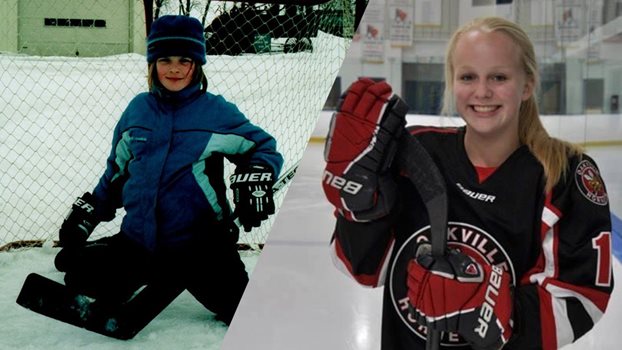
Coach Connection: Campbell & Maltais
Meet Bill Brown and Bradi Cochrane, minor hockey coaches that had a meaningful and lasting impact on players from Canada’s National Women’s Team
Every member of Canada’s National Women’s Team began their careers the same way: by playing at the grassroots of our game. Along the way, they had coaches that helped to shape their playing style and boost their love of hockey.
Here’s a look at two players, two coaches and two lasting impressions.
Kristen Campbell and Bill Brown
Bill Brown coached goaltender Kristen Campbell alongside his daughter through the Brandon Minor Hockey Association. Brown noticed Campbell’s talent early on and worked hard to grow the game in the province for her and other girls coming through the program.
Hockey Canada (HC): You started coaching Kristen at a very young age. What are some of your memories of her as a player back then?
Bill Brown (BB): I can remember when we did our draft, the fellow I was volunteering with, he said we have a girl and she wants to be goalie. It was perfect because we were [rotating through] everybody at the time. But Kristen, right from day one, she was a goalie and that's what she wanted to be. Being the old goalie that I was, I had someone in love with the sport who’s is in love with the position. The first thing I saw with Kristen, even at that very, very young age was just so much natural ability. It was things I was showing her about stance and gloves and how to hold your stick. It was like ‘Oh, she's already doing that.’ So, there’s just that natural ability.
HC: Is there anything that stood out to you about Kristen?
BB: When she was playing U18 and then she went to a prep school in Winnipeg, she initiated that change because she saw it as a way to make herself better. And then when [the University of North Dakota] folded [its women’s hockey program] and she was there, I remember messaging her at that time, ‘You'll keep going kid.’ Of course, she found a home [at the University of Wisconsin] and it turned out to be very, very good. But I think the one thing that I tried to pass on to my kids is if you want something, go get it. She's a shining example of wanting something and having the support in order to do it. All of us are so proud of her but she's done so much of it herself.
HC: Bill, what message would you give to Kristen?
BB: Enjoy the moment. Live in the moment, keep working hard and have fun because those moments, they're here and then they're gone. Enjoy the hard work you put in and where it's taken you and see how far it can take you now.
HC: Kristen, what message would you give to Bill?
Kristen Campbell: I would just thank him for everything he did for me when I was younger. I think he recognized potential in me from a young age, and he really pushed me to be better and knew that I wanted to get to the highest level possible.
Emma Maltais and Bradi Cochrane
After an injury during her NCAA hockey career, Bradi Cochrane transitioned into coaching to stay connected with the game. Cochrane helped the Oakville Hornets establish their high-performance program, where she coached forward Emma Maltais from U15 AA through to the Provincial Women’s Hockey League (PWHL).
HC: Can you talk about how you started coaching Emma?
Bradi Cochrane (BC): We were trying to develop this high-performance program with our U15, U18, and U22 programs and Emma was playing U13 boys at the time and we knew she'd be around the transition [age] to come over to girls. We got lucky enough to have her in our U15 program. I'm coaching [in the PWHL] at the time and she was so talented, she played 22 games with me as a U15. So right from a young age when we first got her to the Hornets program, she was [playing in the PWHL]. And then she was with me for three years.
HC: When you first began coaching Emma, what qualities stood out to you?
BC: There's a word that always jumps to my head when I think of Emma and it's the word relentless. She's just relentless in everything she does. I honestly can't tell you that she’s ever had a bad practice. You fight the puck and all that type of stuff, but her effort level and her intensity never changes. And I think that's a special piece; obviously it's special because she is where she is right now. But yeah, relentless. Her work ethic on and off the ice. She's a gym rat, she loves to be in the gym. She loves hard workouts. She's just so passionate about anything she does. I personally feel blessed that I had an opportunity to help her develop.
HC: Bradi, what message would you give to Emma?
BC: First and foremost, I'm just so proud of her. I'm proud of the person and player that she's become. But I see so much more for her in the future, too. I feel like her national team career is really, truly just beginning. If my little [son] can grow up to be like Emma, I'd be pretty happy.
HC: Emma, is there a message you would like to give Bradi?
Emma Maltais: She's incredible. I still talk to her all the time. She's such a good hockey brain, just always watching the game. She really taught me not only how to play the game, but how to think the game. And that's really helped me moving forward into college and into the national level. I think she saw something in me and pushed me to look farther into the game, and look farther into my own future, to believe in myself so I could make it one day.
Looking to get involved behind the bench in your community? Contact your local hockey association and visit HockeyCanada.ca/Coaching for more information.
For more information: |
- <
- >
